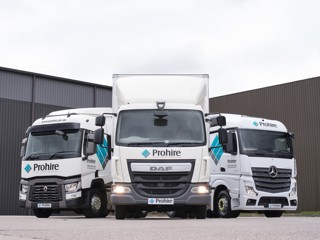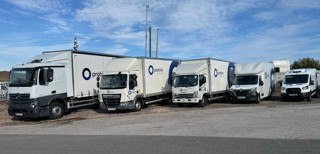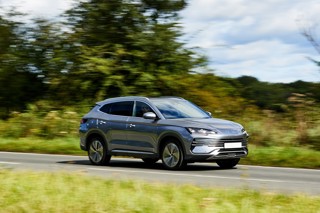Corporate car sharing is undergoing significant growth in the UK as fleets look to lower costs, reduce CO2 emissions and increase their duty-of-care by reducing reliance on grey fleet vehicles.
In February last year, research expert Frost and Sullivan predicted the ‘new wave’ of corporate car sharing across Europe was well on the way to becoming a tsunami. In 2013 there were 2,000 shared business vehicles across the continent: in five years’ time Frost and Sullivan believes there could be more than 100,000.
A subsequent London-centric white paper, commissioned by Avis Budget-owned car club Zipcar, predicted the 140,000 Londoners currently using car share schemes (both for business and private use) will balloon to 800,000 by 2020.
In turn, this will cut CO2 emissions by 6%, take 120,000 cars off the capital’s roads and save individuals and businesses an estimated £360 million a year.
The potential growth in car sharing is evidenced by the fact that many rental and leasing companies are now providing schemes, meaning it is no longer just the preserve of car clubs. Rental giants Enterprise Rent-A-Car and Hertz, along with leasing company Alphabet, are some of the industry’s major businesses which offer car sharing schemes, while car clubs such as City Car (recently acquired by Enterprise, see page 16), Zipcar, and Co-wheels provide both private and business hire of shared vehicles.
In the main, the schemes share many similarities: all offer ‘keyless’ cars, equipped not only with telematics to monitor driver usage, but with technology that allows specific user access via systems such as radio frequency identification (RFID) swipe cards or fobs. Most products also offer fuel cards. Rather than having to manually fill in a pool car diary, the vehicles are booked remotely, via either a booking app or website, which allows staff and managers to view car availability and book in real-time.
All providers give clients the option to park their vehicles in designated private or communal car parks, depending on business need, or in allocated public parking bays (especially the case for public sector cars used by staff and the public).
However, the contract type depends on your fleet needs. Alphabet’s AlphaCity and Enterprise Rent-A-Car’s CarShare are both leasing arrangements, effectively providing a leased car pool to companies. Enterprise provides a monthly contract review, whereas AlphaCity contracts run from two years and upwards.
Other solutions, including Hertz’s 24/7 product and the dedicated car clubs, allow businesses to lease their own shared fleet or rent cars on an hourly basis in the same way the general public do, usually with corporate discounts.
Payment models also vary. At City Car, for example, a business with more than four drivers has to pay an annual fee of £8.33 per driver, with an hourly rate of £5.17 or a daily rate of £43.33. Its City Van offering has a membership fee of £20 a year with an hourly rate of £8.95/daily rate of £79.95. Mileage is claimed at 28ppm.
Hertz 24/7 requires no upfront fee, while an hourly rate for a family car is £6.50, or £52 for 24 hours.
Contract types also vary. For example, Co-wheels and City Car provide rolling monthly reviews for their lease contracts, while Zipcar determines leasing terms case-by-case.
Customers can lease or rent an array of new vehicles, often low emission models including electric vehicles, and accounts come with all-inclusive servicing, insurance, admin and usage reporting.
Duty-of-care obligations
Shared usage has three key benefits: companies don’t lose money through unnecessary rentals; mileage and emissions are cut through efficient usage; moving grey fleet users on to sharing schemes meets duty-of-care obligations.
“A self-serve hourly booking system means fewer cars are needed to satisfy a given number of trips and management has full visibility on actual usage information,” says Mark Walker, general manager of Zipcar.
“One employee may need a car for a meeting in the morning and another needs the same car for the afternoon.
“Compare this to daily rental where, in most cases, you are required to book a car for a minimum of one full day. In this situation you would have to rent two cars, when you could share one. For businesses operating a grey fleet, car clubs give them a significant opportunity to cut costs.
“Our customer Croydon Council now saves £500,000 a year from the replacement of its expensed private mileage scheme.”
Hertz says its 24/7 scheme removes many of the uncertainties that can be associated with pool cars or grey fleets.
“If you’re operating a pool fleet, do you know where it is and do you know how well utilised it it? What level of control do you have?” asks Neil Cunningham, general manager of Hertz UK. “Look again at your grey fleet and realise that a technology-enabled pool fleet may be a solution for you.”
Hertz’s 24/7 – its hourly rental product – was launched as ‘Connect by Hertz’ in December 2008, before becoming ‘Hertz on Demand’ and then ‘24/7’.
It was originally a business-to-consumer product before the rental company was contacted by Heathrow Airport, which saw the potential of replacing its existing pool fleet with 24/7 cars.
“It replaced 12 leased pool cars with nine tech-enabled cars and immediately realised savings of 25-30% just by reducing the number of vehicles operated,” says Cunningham.
Other companies have followed suit, including PwC and Sky, with several more in the pipeline.
Hitachi Capital Vehicle Solutions is currently working with one of its larger customers to reduce its expenditure on daily rental. This will see it placing two vehicles on site which can be used by multiple employees.
“This will significantly reduce delivery and collection charges associated with rental vehicles,” says Kathleen Whittam of Hitachi Capital Vehicle Solutions. “Employees will also be able to check availability and book the vehicles through a smartphone app, making the process quick and easy. By having the vehicles on-site, ready to use, damage queries and fuel disputes are also addressed, along with the reduced transport costs.”
Car sharing schemes may also have hidden benefits: one company found it improved employee productivity.
Adrian Bewley, director of business rental UK and Ireland at Enterprise Rent-A-Car, says: “One fleet found introducing Enterprise CarShare almost eliminated a culture of ‘3pm meetings’. It mandated vehicles be returned to base after use and the appeal of the late afternoon off-site meeting, and the associated loss of productivity when staff thought it wasn’t worth going back into the office afterwards, dwindled.
“This organisation was being pushed to cut costs and faced the possibility of redundancies, but we were able to help it lower the cost of business travel without affecting its services. Critically, this helped save jobs.”
Car sharing can also offer an additional revenue stream to operators, with some council-run schemes renting out their leased club vehicles to residents outside working hours.
However, car sharing schemes can also have some initial teething problems. Michael Vickers, fleet manager at Portsmouth City Council, says negative feedback from staff related to getting used to online booking when they want to use the council’s AlphaCity vehicle.
“Like any new system it was a different way of doing things, so there was a bedding in period where I was quite hands-on with staff, taking them through everything. But it has been pretty painless since,” he says.
Enterprise advises a planned roll-out and demonstrations to staff. “One of the lessons we have learned is the importance of engaging employees before we launch an initiative,” says Bewley. “We’ve helped customers by running roadshows to walk drivers through the process and ensure they understand how the system works.”
Aberdeen City Council leases 23 vehicles from Co-wheels, nine of which are exclusively for staff use, including two EVs, and it currently has 450 staff registered on the scheme.
Council spokesman Alan Simpson, who promotes the service to staff and local residents, admits to occasional glitches with telematics, as well inconsiderate users.
“There are always people that don’t cancel bookings, and it can be frustrating turning up and finding that the last person hasn’t plugged an electric vehicle in properly – but thankfully these events are becoming less common.”
Perhaps the biggest barrier to adoption is cost, says Paul Hollick, chairman of the Institute of Car Fleet Managers.
“It can be very difficult to produce a positive business case at present,” he says. “Other barriers are the time it takes to implement a scheme, and why take on additional costs when fleets may have surplus vehicles that could be used?”
Bewley adds: “Car sharing is a great tool, but not an entire solution – sometimes it might be more cost-effective to use public transport, rent for the day or even not to travel at all. Only data will let fleet managers know for sure.”
Bespoke shared fleets
Suppliers know there is no one-size-fits-all fleet solution, and they work with clients to provide bespoke shared fleets.
The providers Fleet News spoke to all agreed car sharing might not be relevant for all employees – typical leased/rented vehicles still make sense for staff based on the road – however, shared fleets were ideal for short journey usage.
“Field-based staff will always need their own dedicated vehicles, but those who are largely office-based with intermittent transport requirements are the perfect candidates for car sharing,” says David Brennan, chief executive of Nexus Vehicle Rental. Many car sharing converts are public sector organisations leasing shared fleets.
However, UK car clubs also have thousands of smaller business clients using their standard rental service.
“Our clients include everyone from start-up digital businesses to NHS trusts, right back to charities and painters and decorators,” says Vicky Shipway, of City Car Club.
In fact, Shipway is convinced there is a car sharing solution for everyone. “There is such incredibly diverse range of products available – including systems, telematics and staff support to companies that keep their own pool cars – that there is a miniscule number of businesses that wouldn’t benefit from a car sharing solution,” she says.
“It’s cheaper, makes staff more productive, minimises admin, removes exposure to corporate manslaughter legislation, benefits wider society and ticks green boxes.”
Case study: Portsmouth City Council
Following the need to replace an old pool car, Portsmouth City Council opened an AlphaCity account in May 2014 with Alphabet, trialling one vehicle shared between 25 staff. The council is now arranging to lease its second AlphaCity Car.
Fleet manager Michael Vickers says the biggest benefit has been reduced administration. “We have had quite positive feedback from staff,” he says. “They like the swipe card system for getting into the vehicle; the only negative feedback has related to the booking system, where people have had teething problems getting used to it.
“The biggest benefit has definitely been that there are no keys, and the booking system is clear and open.”
Vickers adds: “AlphaCity is a viable proposition for anyone replacing a conventional pool car. I think it will tempt more grey fleet users if they see how easy cars are to access.”
Case study: Aberdeen City Council
When it came to replacing its pool car fleet in April 2012, Aberdeen City Council partnered with Co-wheels to launch the Aberdeen Car Club: it now runs nine exclusive-use cars for staff and has taken on a further 14 vehicles for public use.
An Energy Saving Trust review found the partnership has created an annual saving of approximately £40,000 for the council, through efficient business usage and revenue generated from public use.
According to council spokesman Alan Simpson, the business case has definitely been achieved and the scheme’s popularity among staff and residents is outstripping supply.
“We have got more staff to use the cars than our previous pool cars – before it was 200 employees, now it’s 450,” he says.
“The average emissions of the car club fleet are much less than those of the grey fleet vehicles. The car club fleet is 63g/km C02. At our last fleet review in 2011, grey fleet emissions sat at 150g/km.
“Just by encouraging staff to use the car club, we are instantly making carbon savings, without cutting mileage, and we are able to spend more time doing other work, rather than running around after cars.
“However, demand still outpaces supply for staff so we’re keen to fund more exclusive use vehicles, and around 31.4% of residents don’t have access to a car so we want to help improve their opportunities.”
Case study: York Teaching Hospitals Trust and Enterprise CarShare
York Teaching Hospitals Trust joined Enterprise Rent-A-Car CarShare in July 2014, leasing 16 vehicles which can be used by 350 staff across two sites.
Richard Vincent, assistant director of estates and facilities at the Trust, has been particularly impressed with the account management, as well as impressive initial savings.
He says: “Enterprise has taken full control, which means no day-to-day management is required. It provides us with detailed management information and our account manager regularly suggests travel improvements to save further costs and increase efficiencies.”
Vincent adds: “The ease of using the scheme, combined with the fact that Enterprise ensures the cars are constantly clean and presentable, means take-up has been beyond our initial expectations.
“In a few short months it has proven to be more economical than grey fleet and we’ve already seen savings of up to 20% compared to mileage reimbursement.
“It has been a fantastic tool to help us make significant financial savings along with CO2 reduction, efficiency improvements and the removal of duty of care liability.”


















Login to comment
Comments
No comments have been made yet.